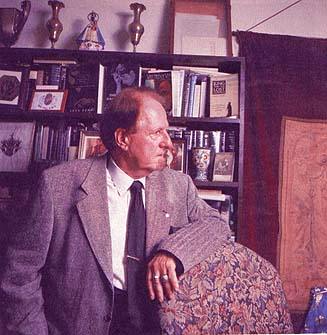
October 6, 2002
Metropolis / Chat Room
Near the nexus of Hillhurst Avenue and Sunset and Hollywood boulevards, Bishop Stephan Hoeller has presided since 1977 at Ecclesia Gnostica, the tiny, incense-infused chapel of the Gnostic Society. Gnosticism, an ancient form of Christianity that flourished in the 1st to 3rd centuries, rejects doctrines such as original sin and emphasizes transcendence through inward, intuitive knowledge ("gnosis") of the divine spark in each individual. Condemned as heresy by early Roman Catholic authorities, gnosticism has drawn renewed interest in recent decades thanks in part to the writings of Carl Jung and religious scholar Elaine Pagels. Hoeller, 70, a Hungarian émigré whose parish extends to Portland and Salt Lake City, recently published "Gnosticism: New Light on the Ancient Tradition of Inner Knowing" (Quest Books). — AL RIDENOUR
Where exactly do mainstream Christians and Gnostics part ways?
Where it comes to what is considered salvific, or what saves. We don't proselytize. There's no belief that coming to us you'll be immediately saved and by not coming to us that you'll be lost. Gnosticism has often been described as "salvation through knowledge," but Gnosis doesn't mean knowledge of particular data. Rather, it's an inner "knowingness," a change of consciousness. Salvation through the death and suffering of Jesus is not part of our thought.
What is the place of Jesus in Gnostic tradition?
The Gnostics have held that there are always messengers of light who come from the inner worlds as archetypes of transformation, though many feel that Jesus was perhaps the latest and the greatest of these. However, you'll have no difficulty finding experiences resembling gnosis within other religious contexts--the samadhi of the yogis, the nirvana of the Buddhists, satori within Zen Buddhism.
How would you explain the revived interest in Gnostic thought?
I believe there are two reasons for this. The first is the so-called Nag Hammadi Library [1,500-year-old papyrus codices found in Egypt in 1945], the largest body of original Gnostic literature ever discovered. It was translated into English in the mid '70s, giving us a more accurate look than we'd had through hostile secondhand sources. This allowed people to see that gnosticism is really far less bizarre and marginal than has been assumed. The second issue is a certain harmony between this material and modern and postmodern thinking. Some of these convergences occur within the depth psychology of Carl Jung. I also believe we are beginning to find echoes of Gnostic philosophy within the study of chaos theory or the approach of deconstructive thinkers.

Bishop Stephan Hoeller: Gnostics "look inward, but don't deny the outer world."
Is Los Angeles "Gnostic-friendly"?
When I came from Hungary, I had a kind of poetic intuition that the city was re-embodiment of the cultural and spiritual diversity of ancient Alexandria where the Gnostics, the Neo-Platonists and all these old boys were. America enjoys exceptional religious freedom, particularly among those who have migrated to the West Coast and no longer feel compelled to simply follow the faith of their parents.
Gnosticism was mentioned in some discussions of the 1997 Heaven's Gate cultist suicides in Rancho Santa Fe. Can you comment on that?
People in the press and even some scholars jumped to the unjustified conclusion that because Gnostics feel earthly life is a relatively lowly condition, they are therefore disposed toward religiously motivated suicide. But nowhere in our tradition do we find any indication of this. We believe in overcoming the darkness, not plunging into it.
How does a Gnostic transcend worldly entanglements?
It's sort of what our Buddhist friend Alan Watts called "the shifting of the psychological point of gravity." Gnostics aren't exhorted to embrace poverty or chastity or vegetarianism. We look inward, but don't deny the outer world. We can smell the flowers--maybe even pick a few along the way. But we must keep walking.
Where does Gnosticism fall in with the New Age movement?
New Agers are very much "in denial" of the dark side, and the Gnostics not at all. We feel that we must recognize both dark and light.
Have you personally ever been called a heretic?
Not since my youth. When I'd have the occasional dispute with Catholic clergy and fellow students, I'd hear, "Ah, there goes Hoeller the heretic." Even then it was rather jocular.
PHOTOGRAPHER: NEIL A. FRANCE
Copyright 2002 Los Angeles Times